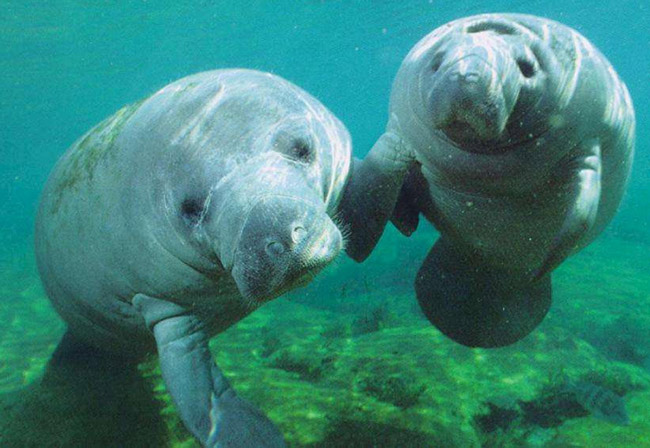
A cold-related die-off of manatees in early 2011 set the stage for a third straight year with high numbers of deaths for the species. Biologists with the research arm of the Florida Fish and Wildlife Conservation Commission documented 453 manatee carcasses in state waters in 2011.
There were no recorded manatee deaths in Flagler waters, however. There were 34 in Volusia County. Manatees’ better fortunes locally may buttress Flagler County officials’ efforts to stave off speed zones in the county’s portion of the Intracoastal Waterway.
During the past three years, biologists documented the highest levels of cold-related manatee deaths, with the “cold stress” category accounting for 112 in 2011, 282 in 2010 and 56 in 2009. In the previous five years, cold stress accounted for an average of 30 manatee deaths per year.
The total number of reported manatee deaths in 2011 was the second-highest on record. Biologists documented a record 766 manatee deaths in 2010 and recorded the third-highest total of 429 in 2009.
“We are concerned about the number of manatee deaths the past three years, including those resulting from exposure to cold weather,” said Gil McRae, director of the FWC’s Fish and Wildlife Research Institute. “Over the next few years, we will use data from monitoring programs to better understand any long-term implications for the population. We will continue to work with our partners to enhance the availability of natural warm-water sites, which are important habitats for the species’ survival,” McRae said.
FWC researchers, managers and law enforcement staff work closely together to evaluate mortality data and identify necessary actions. Managers focus on actions that can reduce risks to manatees and protect foraging and warm-water habitats. The FWC’s Division of Law Enforcement, in cooperation with partner agencies, uses knowledge of local boating habits, well-posted speed zones and up-to-date manatee information as part of its on-the-water enforcement operations. Informing boaters about manatee conservation and enforcing manatee-protection zones are priorities for the FWC.
The county-by-county 2011 preliminary mortality numbers are posted below.
Florida residents can help manatees by purchasing the manatee specialty license plate, available at county tax collectors’ offices. The funds collected for these plates go directly to manatee research and conservation. To learn more about manatee conservation, go to MyFWC.com/Manatee. To report a dead or distressed manatee, call the FWC’s Wildlife Alert Hotline at 888/404-3922.
![]()
2011 Manatee Death Count in Florida, by County





























Arthur Woosley says
Anybody want to tell Mayor Netts and his speed zone committee about these stats, then again don’t waste your time, as I understand he has a side job that caters to those big yachts that so often abuse our waterway.
Obviously Flagler has been very lucky to this point, but numerous NON-COMPLIANT dock permits issued in gross error by an incompetent DEP could soon change that and add to these unfortunate totals.
More fatalities are likely to happen in the future, all due to the fast moving large yachts which traverse our preserve, once you combine those yachts with oversized non-compliant docks, it becomes a recipe for manatee disaster.
Our local manatees families have little choice other than to move out into the center of the ICW ( the most dangerous area) to avoid these same docks, which in turn makes these creatures very vulnerable to boat strikes.
Their favorite hangouts in season, are at Mirror Lake and of course Gamble Rogers State Park both located in Flagler Beach, a travel distance of less than a mile lies between these two locations, a very hazardous distance for them however.
Appeals have been made to the FWC, our County Commission, Save the Manatee Club, Newspapers etc. to do something about this abusive situation, in order to better protect our manatees and our preserve, unfortunately all appeals have fallen on deaf ears.
It appears nobody has the nerve (intestinal fortitude), or will to take on this ALL powerful bureaucratic agency known nationally as the DEP, and of course no attorney wants to deal with them, as slip and fall accidents are easy money.
Talk in our county is cheap when it comes to protecting our environment, and all the special creatures that are only trying to survive here alongside us, which is indeed very sad commentary for sure.
Liana G says
I wish that schools would offer field trips to places like wildlife rescue and habitats so children can learn about the animals in our environments, appreciate their purpose, and be made aware of the dangers and suffering these animals are exposed at the hands of humans.
We visited the Marinelife Center in Juno Beach, a turtle rescue center, last weekend and it was very sad to see all those injured turtles, all sizes, mostly from boat propellers – head/brain injuries, lost limbs, deep severe lacerations on the backs – some were also rescued because they showed signs of ill health caused by swallowing fishing hooks and lines that ended up entangled inside their body.
Field trips to these places will expose children to these realities they can share with their parents. It’s not that people don’t care, many just don’t know and this would be a way of educating them/raising awareness. If we can make children aware of the harm caused to animals by boat propellers, fishing hooks and strings, drink straws and other trash (there is a Giant garbage patch floating in Pacific twice the size of Texas), we are on the start of something. Even field trips to the humane society can serve a purpose because children can say to their parents ‘I want a shelter pet instead of one from a pet mill/store’. Kids do grow up and their experiences will guide the decisions they make when they become adults and parents.